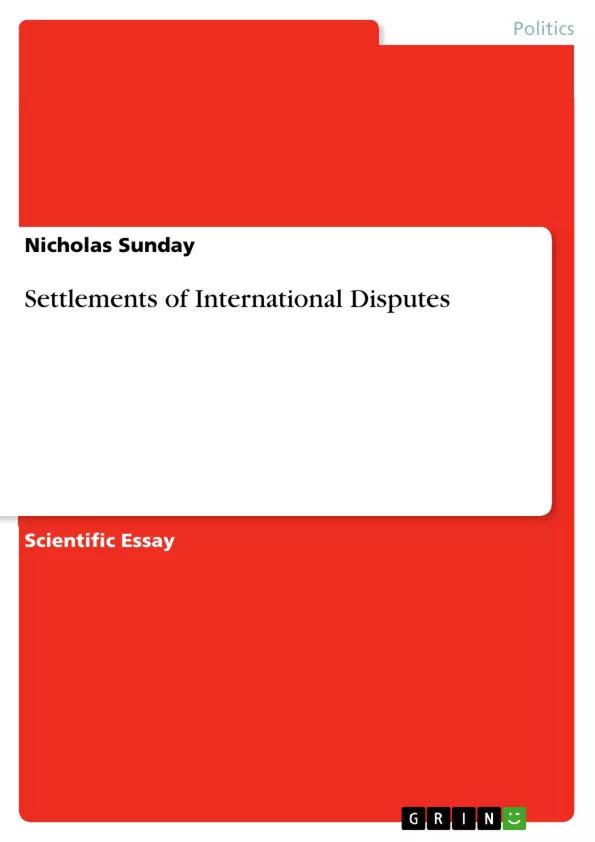Article 2, paragraph 3 of the UN Charter requires that: "All Members shall settle their
international disputes by peaceful means in such a manner that international peace
and security and justice are not endangered. The UN General Assembly, in adopting
its 1982 Manila Declaration on the Peaceful Settlement of Disputes, emphasized the
need to exert utmost efforts in order to settlement any conflicts and disputes
between States exclusively by peaceful means’’ and that’’ the question of the
peaceful settlement of disputes should represent one of the concerns for States and
for the United Nations". In age of nuclear weapons, the importance of the principle of
peaceful settlement of international disputes is apparent.
Table of Contents
- CHAPTER 1 PRINCIPLES OF PEACEFUL SETTLEMENT OF DISPUTES BETWEEN STATES
- WHAT IS AN INTERNATIONAL DISPUTE?
- DO WE NEED TO SETTLE INTERNATIONAL DISPUTES?
- DO STATES HAVE AN OBLIGATION TO SETTLE THEIR DISPUTES PEACEFULLY?
- WHAT KINDS OF DISPUTES ARE THERE?
- DO DISPUTES FOLLOW A TYPICAL PATTERN?
Objectives and Key Themes
This text aims to explore the principles and practices of peaceful settlement of international disputes. It examines the definition of international disputes, the necessity of their resolution, the legal obligations of states in this regard, the types of disputes that exist, and the typical patterns disputes follow.
- Definition and nature of international disputes
- Obligations of states to settle disputes peacefully
- Types and characteristics of international disputes
- The role of the UN Charter in dispute resolution
- Typical patterns and strategies in dispute resolution
Chapter Summaries
CHAPTER 1 PRINCIPLES OF PEACEFUL SETTLEMENT OF DISPUTES BETWEEN STATES: This chapter lays the groundwork for understanding the peaceful resolution of international disputes. It begins by establishing the foundational principle of peaceful dispute settlement as mandated by the UN Charter, emphasizing the paramount importance of this principle, particularly in the nuclear age. The chapter then delves into a detailed definition of "international dispute," clarifying its key elements, such as specificity and the presence of conflicting claims. It differentiates between general antagonism and a formally defined dispute, highlighting the significance of this distinction for triggering established dispute resolution mechanisms. The chapter further explores the necessity of settling international disputes, acknowledging that while disputes are inevitable, those posing significant risks require proactive management. It discusses various approaches, including state intervention, third-party intervention, and the strategic timing of intervention. Finally, the chapter analyzes the legal obligations of states to settle disputes peacefully, referencing pertinent articles of the UN Charter and highlighting the distinction between negative obligations (avoiding actions that endanger peace) and affirmative obligations (actively seeking peaceful resolutions). The role of the Security Council in dispute resolution is also examined, with detailed explanation of the relevant articles outlining its powers and responsibilities. The chapter concludes by touching on the classification of disputes by subject matter, character, and relations between parties.
Keywords
International disputes, peaceful settlement, UN Charter, dispute resolution, negotiation, mediation, arbitration, adjudication, international law, state obligations, conflict resolution, legal obligations, international peace and security.
Frequently Asked Questions: Principles of Peaceful Settlement of Disputes Between States
What is the purpose of this text?
This text explores the principles and practices of peaceful settlement of international disputes. It examines the definition of international disputes, the necessity of their resolution, the legal obligations of states, the types of disputes, and typical patterns disputes follow.
What topics are covered in the text?
The text covers a range of topics, including the definition and nature of international disputes, the obligations of states to settle disputes peacefully, the types and characteristics of international disputes, the role of the UN Charter in dispute resolution, and typical patterns and strategies in dispute resolution.
What are the key themes of the text?
Key themes include the definition of "international dispute," the legal obligations of states to resolve disputes peacefully (both negative and affirmative obligations), the different types of disputes, and the role of the UN Charter in providing a framework for peaceful dispute resolution. The text also analyzes typical patterns and strategies employed in resolving these disputes.
What is an international dispute, according to the text?
The text provides a detailed definition of an international dispute, emphasizing the need for specificity and the presence of conflicting claims. It differentiates between general antagonism and a formally defined dispute, highlighting the importance of this distinction for activating dispute resolution mechanisms.
Why is peaceful settlement of disputes necessary?
The text argues that while disputes are inevitable, those posing significant risks require proactive management. It discusses various approaches, including state intervention, third-party intervention, and the strategic timing of intervention. The paramount importance of peaceful settlement, especially in the nuclear age, is stressed.
What are the legal obligations of states regarding dispute settlement?
The text examines the legal obligations of states to settle their disputes peacefully, referencing relevant articles of the UN Charter. It distinguishes between negative obligations (avoiding actions that endanger peace) and affirmative obligations (actively seeking peaceful resolutions). The role of the Security Council in dispute resolution is also detailed.
What types of disputes are discussed?
The text classifies disputes by subject matter, character, and relations between parties, though specific examples of each type aren't explicitly detailed in this preview.
What is the role of the UN Charter in dispute resolution?
The UN Charter serves as the foundational legal framework for peaceful dispute settlement. The text highlights the relevant articles outlining the powers and responsibilities of the Security Council and other organs in this regard.
What are some examples of dispute resolution methods?
While not explicitly detailed in this preview, the keywords suggest the text covers negotiation, mediation, arbitration, and adjudication as potential methods for resolving international disputes.
What are the key terms used in the text?
Key terms include: International disputes, peaceful settlement, UN Charter, dispute resolution, negotiation, mediation, arbitration, adjudication, international law, state obligations, conflict resolution, legal obligations, and international peace and security.
- Citation du texte
- Professor Nicholas Sunday (Auteur), 2013, Settlements of International Disputes, Munich, GRIN Verlag, https://www.grin.com/document/233214



